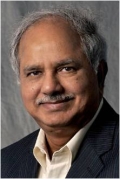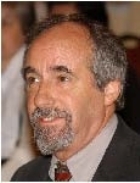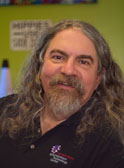Keynotes
We have confirmed the presence of the following keynote speakers: Dr. Nick Bowen (Vice President of Technology, IBM), Prof. Raj Reddy (Carnegie Mellon, Turing Award winner), Dr. Alistair Cockburn (the Agile Manifesto), Prof. David Garlan, (Director of Professional Software Engineering Programs, School of Computer Science, Carnegie Mellon University), Prof. Don Marinelli (Executive Producer, Entertainment Technology Center, Carnegie Mellon University).
Dr. Nick Bowen.
Vice President of Technology, IBM
Dr. Nicholas (Nick) Bowen is the Vice President of Technology, reporting to Linda Sanford, Senior Vice President, Enterprise On Demand Transformation & Information Technology. Dr. Bowen is responsible for driving the Technology Team topics, assessments and studies that shape the technology strategy and business opportunities for IBM. These are linked to the Corporate Technical Milestones, which set and track IBM's technology commitments and progress. He has leadership roles in the Technical Leadership Team, and Technical Review Team. At the same time, he has responsibility for managing the corporate nomination, selection and evaluation processes for employees to be named IBM Fellow or Distinguished Engineer, in addition to determining what technical contributions warrant a Corporate Award. Another key responsibility Dr. Bowen has is overseeing of the annual Corporate Technical Recognition Event.
Prior to his current position, in January 2007, he was appointed Vice President of Technical Strategy and Worldwide operations for IBM’s Research Division which include driving the creation of the Global Technology Outlook, leading the worldwide operations and I/S teams, and driving the research strategy, plan and measurement processes.
Prior to that role current position, Nick held several executive positions within the IBM Systems & Technology Group (STG) including: vice president, software development, with responsibility for all server operating systems (zOS, AIX, i5OS, zVM, VSE, Linux), firmware development for IBM Systems z, i, p, and x, management software (IBM Systems Director) and hardware management systems (HMC, FSP); chief technology officer and vice president of software architecture for the same group of products; vice president of UNIX and IBM xSeries software for the server division with responsibility for driving eServers into growth markets for UNIX, Linux, Windows, GRID, and High Performance Computing where he was responsible for delivering leadership management solutions for key emerging technologies such as BladeCenter and Linux Clusters; and vice president of xSeries software and performance, responsible for all software development, performance, and hardware service processor development for xSeries, including responsibility for the IBM Center for Microsoft Technologies in Kirkland, Washington.
Prior to his positions with STG, he was with IBM Research. Nick was director of computing utilities, where he spearheaded the definition of the "intelligent infrastructure" research program, and he was director of servers with worldwide responsibility for the Research programs in servers. This group had many exploratory system projects in addition to making contributions to AIX, OS/390, AS/400, and xSeries servers as well as many products within the IBM Software Group. He made technical contributions to the S/390 Parallel Sysplex effort and led several of the OS/390 initiatives to embrace Internet and object technologies.
He joined IBM at East Fishkill, New York where he worked in a datacenter and learned the trials and tribulations of maintaining a 24x7 datacenter. He is a senior member of IEEE and a member of ACM. His research interests are operating systems and fault-tolerant computing.
Nick’s career with IBM spans over 25 years and he has expertise in high availability, memory management, and parallel processing. He received the B.S. degree in computer science from the University of Vermont, a M.S. degree in computer engineering from Syracuse University, and the Ph.D. in electrical and computer engineering from the University of Massachusetts at Amherst. He is a senior member of the Institute of Electrical and Electronics Engineers, a member of Association of Computer Machinery. He served on the Computer Science Advisory Boards of Florida International University and North Carolina State University and helped found the Computer Science Advisory Board at the University of Puerto Rico at Mayaguez. His research interests are operating systems and fault-tolerant computing.
Dr. Alistair Cockburn.
Initiator of the agile movement in software development
Alistair Cockburn had been a hardware designer and researcher for 16 years when IBM asked him to write a methodology for object-oriented projects. He's spent the last decade studying and writing about software development and learned that some of the most successful projects have the simplest processes. In 2001 he and 16 other software-development heavyweights met to discuss so-called lightweight methodologies, and one result was the Agile Software Development Manifesto, which includes four value statements: individuals and interactions over processes and tools; working software over comprehensive documentation; customer collaboration over contract negotiation; and responding to change over following a plan.
In this insightful interview with IT Conversations' producer Doug Kaye, Alistair explains how he uses games as a model for software projects, and how he discovered that the term "software engineering" was created on a whim in 1968. He also discusses the American and European aversion to copying: the not-invented-here (NIH) syndrome. "If you want to become a senior designer, you don't get there by finding all the components that are free on the web" even though "that's very cost effective, the customer likes it, the boss likes that, but you didn't get promoted."
Alistair explains how Agile is different from XP (eXtreme Programming) and talks about his forthcoming book on Crystal Clear, his answer to XP.
Prof. Raj Reddy.
Robotics Institute Simon University Professor & School of Computer Science professor
Raj Reddy is one of the world's leading experts on robotics and artificial intelligence. The director from 1979 to 1992 of the Robotics Institute at Carnegie Mellon University in Pittsburgh, Pennsylvania. His interest in civil engineering led him to study at the University of Madras College of Engineering, where he received his bachelor's degree in 1958. Soon after finishing his undergraduate work in India, Reddy moved to Australia,. While in Australia, Reddy worked as an applied science representative for the International Business Machines Corporation (IBM) in Sydney. His primary job used computers for structural analysis. During his post-baccalaureate education his interest and course of study changed from the civil to the computer engineering disciplines. Reddy moved to the United States in 1963 and received his doctorate from Stanford in 1966. He joined the faculty of Stanford University as an assistant professor of computer science. In 1969 he moved to Pittsburgh and joined the Computer Science Department of Carnegie Mellon University. It was here that Reddy began his study of the rapidly expanding fields of robotics and artificial intelligence. He was named director of the Robotics Institute in 1979. Reddy has focused on two areas within the field of robotics: automatons capable of performing manufacturing and assembly-line tasks, and fully autonomous vehicles for land, sea and air operations. Aiming to make this goal a reality, Reddy developed an interdisciplinary program at the Institute that trains students in mechanical engineering, computer science, and management in order to give them the background they need to design the complex robotics manufacturing systems of the future. Reddy remains at the forefront of studies in human-computer interaction. Reddy was presented the Legion of Honor by President Mitterrand of France in 1984 for his service at the World Center for Personal Computation and Human Resources in Paris. He is a member of the National Academy of Engineering, and a fellow of the Institute of Electrical and Electronics Engineers, the Acoustical Society of America, and the American Association for Artificial Intelligence, which he also served as president from 1987 to 1989.
Professor David Garlan, Director of Professional Software Engineering Programs, School of Computer Science, Carnegie Mellon University
Keynote: The Changing Face of Software Architecture and What it Means for Educators
David Garlan is a Professor of Computer Science and Director of Software Engineering Professional Programs in the School of Computer Science at Carnegie Mellon University. He received his Ph.D. from Carnegie Mellon in 1987. His interests include software architecture, self-adaptive systems, formal methods, and cyber-physical systems. He is considered to be one of the founders of the field of software architecture, and, in particular, formal representation and analysis of architectural designs. He has published numerous articles and co-authored two books about software architecture. In 2005 he received a Stevens Award Citation for "fundamental contributions to the development and understanding of software architecture as a discipline in software engineering."
Don Marinelli, Executive Producer of the Entertainment Technology Center, CMU
Donald Marinelli is a tenured Professor of Drama and Arts Management at Carnegie Mellon University and is also the Executive Producer of the Entertainment Technology Center. Professor Marinelli has been at Carnegie Mellon for twenty-six years where he served as the Assistant Head of the Drama Dept. (1980-86) and later the Associate Department Head (1986-95). Dr. Marinelli was integral in creation of the Master of Arts Management (MAM) program, the Master of Fine Arts in Acting degree program with the Moscow Art Theatre School in Russia, and, with colleague Randy Pausch, he co-founded the Master of Entertainment Technology (MET) degree program and the ETC.
A native of Brooklyn, New York, Professor Marinelli has lived in Pittsburgh for thirty-two years, coming here shortly after completing his undergraduate degree at the University of Tampa. He attended Duquesne University in Pittsburgh where he received a M.A. in Clinical Psychology specializing in Existential-Phenomenological Psychology. Professor Marinelli subsequently attended the University of Pittsburgh where he received his Ph.D. in theatre history, literature, and criticism in 1987 with a dissertation on the Italian Futurist F.T. Marinetti.
Professor Marinelli is currently leading the expansion of the Entertainment Technology Center internationally with ETC branch campuses in Adelaide, Australia; Silicon Valley, California; and Osaka, Japan.




